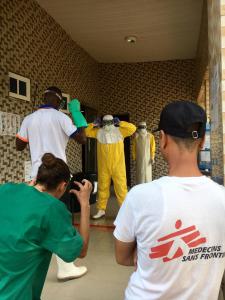Rapid diagnosis and intensified research crucial in managing Lassa fever
Research into better tools for timely diagnosis and treatment is also necessary to save more lives of those affected by Lassa Fever.
A major goal of the MSF collaboration with FETHA and the Ebonyi State Ministry of Health is to train hospital staff to protect themselves from infection. ”
ABUJA, FEDERAL CAPITAL TERRITORY, NIGERIA, January 16, 2019 /EINPresswire.com/ -- – The international medical humanitarian organization Médecins Sans Frontières/Doctors Without Borders (MSF) will participate in the first ever international conference on Lassa fever being held on January 16 and 17 in Abuja, Nigeria. A presentation by MSF doctor Hilde De Clerck, the Emergency Infectious Disease Referent, will discuss MSF experience in managing Lassa fever in a pediatric reference centre in Godoma (Bo), Sierra Leone. — Dr. Maikere Jacob, MSF Medical Coordinator in Nigeria.
“It has been half a century since Lassa fever was discovered in northern Nigeria, but healthcare workers in West Africa still urgently need appropriate equipment and training to safely manage patients of all ages affected by the disease. Research into better tools for timely diagnosis and treatment is also necessary to save more lives in the future,” said Dr. De Clerck as she joined fellow international experts and local health authorities at the conference today in Abuja; Fifty Years of Lassa fever: Rising to the Challenge.
Despite affecting up to 300,000 people per year across West Africa, and leading to more than 5,000 deaths annually, Lassa fever is a poorly understood disease that is challenging to diagnose and treat. Only a few laboratories in affected areas can diagnose the virus—which can lead to delays in starting treatment. While initially spread through contact with infected rats, managing Lassa fever requires appropriate use of personal protective equipment and other infection prevention and control measures, to protect healthcare workers and relatives of patients.
“One of the major challenges of treating Lassa fever is the nature of the disease itself because at the onset, it mimics diseases like malaria. A lot of time is wasted before the patient actually presents for treatment, and the prognosis gets very bad if treatment is not commenced within six days from the onset of symptoms. What we can actually do to contend is to carry out routine tests on almost everybody that has fever to make sure we provide the appropriate treatment,” said Health Commissioner of Ebonyi State, Dr. Umezurike Daniel.
In March 2018, MSF teams joined the response to one of Nigeria’s largest ever Lassa fever outbreaks. Twenty-three states in Nigeria reported 3498 Lassa fever suspects during 2018, with 45 healthcare workers among the 633 confirmed cases. MSF continues to support the 700-bed Federal Teaching Hospital, Abakaliki (FETHA), and the Ministry of Health (MoH) in Ebonyi State, which was one of the hardest hit by the outbreak.
“A major goal of the MSF collaboration with FETHA and the Ebonyi State MoH is to train hospital staff to protect themselves from infection, by rapidly identifying and safely isolating suspected Lassa fever cases presenting in the wards. We also aim to develop improved case management practices, and facilitate preventive actions in the community; all these measures are important steps in saving lives and curtailing transmission of the disease,” said Dr. Maikere Jacob, MSF Medical Coordinator in Nigeria.
______________________________________________________________________________
MSF is present in nine states in Nigeria. In addition, to supporting Lassa fever management in Ebonyi State, the organization responds to humanitarian needs due to the conflict in various locations across Borno and Yobe states. In Sokoto state, MSF provides reconstructive surgery and comprehensive treatment to children suffering from Noma. In Port Harcourt, survivors of sexual violence are offered healthcare and psychological support. In Zamfara State, MSF treats children affected by lead poisoning. In Cross River state, MSF provides primary health care to refugees from Cameroon.
KAYODE EGBELEYE
Medecins Sans Frontieres
+234 7085344328
email us here
Legal Disclaimer:
EIN Presswire provides this news content "as is" without warranty of any kind. We do not accept any responsibility or liability for the accuracy, content, images, videos, licenses, completeness, legality, or reliability of the information contained in this article. If you have any complaints or copyright issues related to this article, kindly contact the author above.

